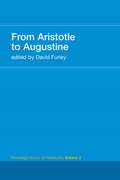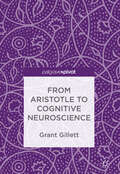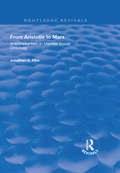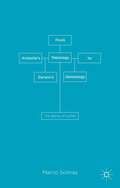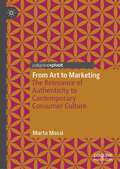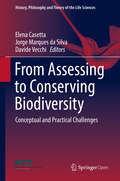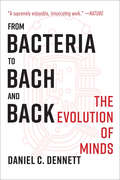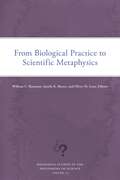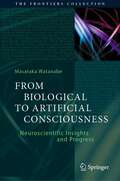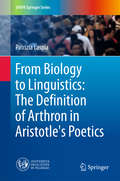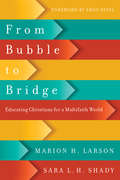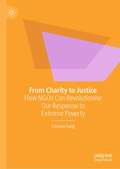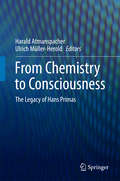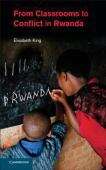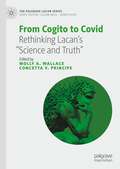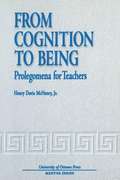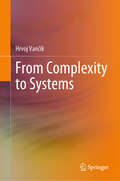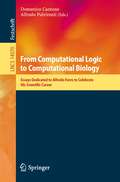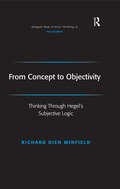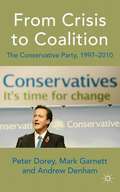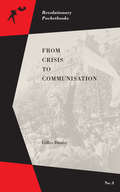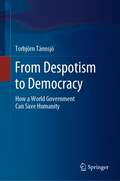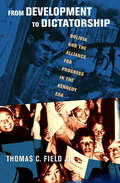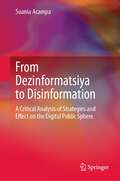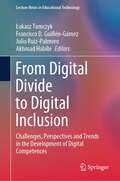- Table View
- List View
From Aristotle to Augustine: Routledge History of Philosophy Volume 2
by David FurleyThis second volume opens with Aristotle's immense influence on philosophy from the beginnings of Christian philosophy in the fifth century AD.
From Aristotle to Cognitive Neuroscience
by Grant GillettFrom Aristotle to Cognitive Neuroscience identifies the strong philosophical tradition that runs from Aristotle, through phenomenology, to the current analytical philosophy of mind and consciousness. In a fascinating account, the author integrates the history of philosophy of mind and phenomenology with recent discoveries on the neuroscience of conscious states. The reader can trace the development of a neuro-philosophical synthesis through the work of Aristotle, Kant, Wittgenstein, Husserl, Merleau-Ponty, Brentano and Hughlings-Jackson, among others, and so explore contemporary philosophical puzzles surrounding consciousness and its relation to cerebral synchrony and connectedness. Of interest to students and scholars of neuroethics, neurophilosophy and philosophy of mind, as well as philosophy of psychiatry, From Aristotle to Neuroscience demonstrates the real essence of consciousness as it increasingly connects with philosophy, law, morality, aesthetics, and spirituality.
From Aristotle to Marx: Aristotelianism in Marxist Social Ontology (Routledge Revivals)
by Jonathan E. PikeFirst published in 1999, this volume from Dr. Jonathan E. Pike is original and provocative and integrates sources from the history of ideas, analytical philosophy, and contemporary social theory. Pike has produced an overall account of Marx which focuses on the concept of human potential and clearly explains its ontological basis. Anyone interested in Marx studies will be indebted to this incisive discussion of the philosophical foundations of Marx’s work.
From Aristotle’s Teleology to Darwin’s Genealogy
by Marco SolinasStarting with Aristotle and moving on to Darwin, Marco Solinas outlines the basic steps from the birth, establishment and later rebirth of the traditional view of living beings, and its overturning by evolutionary revolution. The classic framework devised by Aristotle was still dominant in the 17th Century world of Galileo, Harvey and Ray, and remained hegemonic until the time of Lamarck and Cuvier in the 19th Century. Darwin's breakthrough thus takes on the dimensions of an abandonment ofthe traditional finalistic theory. It was a transition exemplified in the morphological analysis of useless parts, such as the sightless eyes of moles, already discussed by Aristotle, which Darwin used as a crowbar to unhinge the systematic recourse to final causes. With many excerpts, a chronological sequence and an analytical approach, this book follows the course of the two conceptions that have shaped the destiny of living beings in western culture.
From Art to Marketing: The Relevance of Authenticity to Contemporary Consumer Culture
by Marta MassiTaking a new approach to a relatively underexplored area, this book examines the concept of authenticity and its relevance to marketing management. The author draws on several disciplines, including arts, philosophy, sociology and psychology, as well as focusing on important sub-fields within the field of marketing such as consumer behaviour and tourism. Presenting data from interviews with managers and consumers, and summarising and critiquing recent developments within the field, From Arts to Marketing is a timely and much-needed addition to literature and will be useful to those researching consumer behaviour, brand management and marketing more generally.
From Assessing to Conserving Biodiversity: Conceptual and Practical Challenges (History, Philosophy and Theory of the Life Sciences #24)
by Elena Casetta Jorge Marques da Silva Davide VecchiThis open access book features essays written by philosophers, biologists, ecologists and conservation scientists facing the current biodiversity crisis. Despite increasing communication, accelerating policy and management responses, and notwithstanding improving ecosystem assessment and endangered species knowledge, conserving biodiversity continues to be more a concern than an accomplished task. Why is it so?The overexploitation of natural resources by our species is a frequently recognised factor, while the short-term economic interests of governments and stakeholders typically clash with the burdens that implementing conservation actions imply. But this is not the whole story. This book develops a different perspective on the problem by exploring the conceptual challenges and practical defiance posed by conserving biodiversity, namely: on the one hand, the difficulties in defining what biodiversity is and characterizing that “thing” to which the word ‘biodiversity’ refers to; on the other hand, the reasons why assessing biodiversity and putting in place effective conservation actions is arduous.
From Bacteria to Bach and Back: The Evolution of Minds
by Daniel C. DennettOne of America’s foremost philosophers offers a major new account of the origins of the conscious mind. How did we come to have minds? For centuries, this question has intrigued psychologists, physicists, poets, and philosophers, who have wondered how the human mind developed its unrivaled ability to create, imagine, and explain. Disciples of Darwin have long aspired to explain how consciousness, language, and culture could have appeared through natural selection, blazing promising trails that tend, however, to end in confusion and controversy. Even though our understanding of the inner workings of proteins, neurons, and DNA is deeper than ever before, the matter of how our minds came to be has largely remained a mystery. That is now changing, says Daniel C. Dennett. In From Bacteria to Bach and Back, his most comprehensive exploration of evolutionary thinking yet, he builds on ideas from computer science and biology to show how a comprehending mind could in fact have arisen from a mindless process of natural selection. Part philosophical whodunit, part bold scientific conjecture, this landmark work enlarges themes that have sustained Dennett’s legendary career at the forefront of philosophical thought. In his inimitable style—laced with wit and arresting thought experiments—Dennett explains that a crucial shift occurred when humans developed the ability to share memes, or ways of doing things not based in genetic instinct. Language, itself composed of memes, turbocharged this interplay. Competition among memes—a form of natural selection—produced thinking tools so well-designed that they gave us the power to design our own memes. The result, a mind that not only perceives and controls but can create and comprehend, was thus largely shaped by the process of cultural evolution. An agenda-setting book for a new generation of philosophers, scientists, and thinkers, From Bacteria to Bach and Back will delight and entertain anyone eager to make sense of how the mind works and how it came about.
From Biological Practice to Scientific Metaphysics (Minnesota Studies in the Philosophy of Science #23)
by Oliver M. LeanHow analyzing scientific practices can alter debates on the relationship between science and reality Numerous scholarly works focus solely on scientific metaphysics or biological practice, but few attempt to bridge the two subjects. This volume, the latest in the Minnesota Studies in the Philosophy of Science series, explores what a scientific metaphysics grounded in biological practices could look like and how it might impact the way we investigate the world around us. From Biological Practice to Scientific Metaphysics examines how to reconcile the methods of biological practice with the methods of metaphysical cosmology, notably regarding the origins of life. The contributors take up a wide range of traditional metaphysics and philosophy of science topics, including natural kinds, medicine, ecology, genetics, scientific pluralism, reductionism, operationalism, mechanisms, the nature of information, and more. Many of the chapters represent the first philosophical treatments of significant biological practices. From causality and complexity to niche constructions and inference, the contributors review and discuss long-held objections to metaphysics by natural scientists. They illuminate how, in order to learn about the world as it truly is, we must look not only at what scientists say but also what they do: for ontology cannot be read directly from scientific claims. Contributors: Richard Creath, Arizona State U; Marc Ereshefsky, U of Calgary; Marie I. Kaiser, Bielefeld U; Thomas A. C. Reydon, Leibniz U Hannover and Michigan State U; Lauren N. Ross, U of California, Irvine; Rose Trappes, U of Exeter; Marcel Weber, U of Geneva; William C. Wimsatt, U of Chicago. Retail e-book files for this title are screen-reader friendly with images accompanied by short alt text and/or extended descriptions.
From Biological to Artificial Consciousness: Neuroscientific Insights and Progress (The Frontiers Collection)
by Masataka WatanabeHow does consciousness emerge from a brain that consists only of physical matter and electrical / chemical reactions? The deep mysteries of consciousness have plagued philosophers and scientists for thousands of years. This book approaches the problem through scientific studies that shed light on the neural mechanism of consciousness, and furthermore, delves into the possibility of artificial consciousness, a phenomenon that may ultimately solve the mystery. Finally, two key suggestions made in the book, namely, a method to test machine consciousness and a theory hypothesizing that consciousness emerges from a neural algorithm, reveal a novel and credible pathway to mind-uploading.The original Japanese version of this book has become a best-seller in popular neuroscience and has even led to a neurotech startup for mind-uploading.
From Biology to Linguistics: The Definition of Arthron in Aristotle's Poetics (Unipa Springer Ser.)
by Patrizia LaspiaThis book attempts to solve Aristotle's definition of arthron in the XX chapter of the Poetics by seeing it in a new light. This definition has always been considered an unsolvable problem. Starting with a detailed analysis of the Greek text, and of the various attempts to emend the text in order to make sense of it, the book provides an analytical description of the critical literature, showing that the solutions proposed up to now need to be revised.The possible solution is found in viewing the XX chapter of the Poetics not as a classification of parts of speech, as it was usually supposed, but by considering the biological definitions of arthron in Aristotle's corpus. This leads to the conclusion that, in linguistics as well as in biology, arthron is a "joint". In this light, the book offers a new textual conjecture for the first example of arthron in the Poetics.
From Bubble to Bridge: Educating Christians for a Multifaith World
by Eboo Patel Marion H. Larson Sara L. ShadyUnderstanding our religious neighbors is more important than ever—but also more challenging. bridgesFrom Bubble to Bridge
From Charity to Justice: How NGOs Can Revolutionise Our Response to Extreme Poverty
by Vincent FangThis book focuses on the ethical demands of extreme poverty and develops a political theory of practical change. Welding together political realism and moral aspirations, it argues that a re-imagined form of development NGO can help the global North break free from the dominant and persistent charity paradigm and drift towards a justice-based understanding of extreme poverty. It offers an original explanation of why the charity paradigm persists and why the “justice not charity” messages from development NGOs have changed few minds. The author argues that anyone concerned with a paradigm shift from charity to justice need to radically rethink the problem of political communication: who should communicate what messages about extreme poverty in what ways? Based on a rational choice critique of the competitive development NGO sector, the author calls for sector-wide reform and the emergence of a new political agent – the Avant-garde NGO - which transcends the charity frame that NGOs currently find themselves locked in. Further, inspired by literary theory and social psychology, he offers a fresh account of how the Avant-garde NGO could, through reflective public engagement, induce attitude change and lead genuine social and political reform.
From Chemistry to Consciousness
by Ulrich Müller-Herold Harald AtmanspacherThis book reflects on the significant and highly original scientific contributions of Hans Primas. A professor of chemistry at ETH Zurich from 1962 to 1995, Primas continued his research activities until his death in 2014. Over these 50 years and more, he worked on the foundations of nuclear magnetic resonance spectroscopy, contributed to a number of significant issues in theoretical chemistry, helped to clarify central topics in quantum theory and the philosophy of physics, suggested innovative ways of addressing interlevel relations in the philosophy of science, and introduced cutting-edge approaches in the flourishing young field of scientific studies of consciousness. His work in these areas of research and its continuing impact is described by noted experts, colleagues, and collaborators of Primas. All authors contextualize their contributions to facilitate the mutual dialog between these fields.
From Classrooms to Conflict in Rwanda
by Elisabeth KingThis book questions the conventional wisdom that education builds peace by exploring the ways in which ordinary schooling can contribute to intergroup conflict. Based on fieldwork and comparative historical analysis of Rwanda, it argues that from the colonial period to the genocide, schooling was a key instrument of the state in contributing to the construction, awareness, collectivization and inequality of ethnic groups in Rwanda - all factors that underlay conflict. The book further argues that today's post-genocide schools are dangerously replicating past trends. This book is the first to offer an in-depth study of education in Rwanda and to analyze its role in the genesis of conflict. The book demonstrates that to build peace, we cannot simply prescribe more education, but must understand who has access to schools, how schools are set up, and what and how they teach.
From Cogito to Covid: Rethinking Lacan’s “Science and Truth” (The Palgrave Lacan Series)
by Concetta V. Principe Molly A. WallaceThis edited collection examines the contemporary relevance of Lacan’s 1965 essay “Science and Truth” to debates on science, psychoanalysis, ethics and truth. In doing so, it re-considers the established understanding of its argument that psychoanalysis is the only science for the human subject. Over fifty years after Lacan attempted to formalize the relationship between science and psychoanalysis in “Science and Truth,” this volume returns to the categorically systematic yet deeply puzzling ideas of this lecture-turned-essay. The volume begins with a rigorous analysis of the formal logic animating the cogito, which serves as a foundation for the remainder of the book to force a confrontation between the themes laid out in “Science and Truth” and the cultural, intellectual, political, economic, and, of course, scientific movements that we face today. The following five chapters examine various contemporary phenomena, including the destabilizing forces of post-truthism and political nihilism, the ‘non-science’ of filmic depictions of science, the prosopopeia of Lacan’s so-called secular Name of the Father, the pseudoscientific discourse of involuntary celibates, or ‘incels,’ and, finally, the alliance between science and capitalism that has developed out of the Covid-19 pandemic. This project offers an important contribution to contemporary debates about science and ethics that will be of interest to academics working in psychoanalytic and critical theory, and the philosophy and history of science; as well as to clinicians.
From Cognition to Being: Prolegomena for Teachers
by Henry Davis Mchenry Jr.Teachers must constantly invent and re-invent ways of being together with their students to enable both a shared mastery and a shared apprenticeship.
From Complexity to Systems
by Hrvoj VančikThis book sheds new light on the interactions between the science of complexity and the science of systems. Though both of these fields have been independently studied extensively, their interrelations have not been satisfactorily analyzed. By a superficial view, both the sciences are based on the same principles of the holistic behavior of the ensembles consisting of components. The author providing an expert analysis on the theory of complexity and bridges the gap to generalize it, by elaborating on all the observable manifestations of complex forms and behaviors and explaining how it is related to general theory of systems.Particular attention is given to the use of chemical concepts throughout the text to demonstrate the theories as well as the interactions between the two. The central point of this book is the new rational representation of systems that origins from some chemical concepts about the structure of molecules and graph theoretical chemical theory. Thisnovel text appeals to experienced researchers, students, and all those curious about theories of systems, complexities, and theoretical chemistry.
From Computational Logic to Computational Biology: Essays Dedicated to Alfredo Ferro to Celebrate His Scientific Career (Lecture Notes in Computer Science #14070)
by Domenico Cantone Alfredo PulvirentiAlfredo Ferro’s impact on information technology has traversed diverse domains, encompassing Computational Logic, Data Mining, Bioinformatics, and Complex Systems. After first studying Mathematics at the University of Catania, he received a Ph.D. in Computer Science from NYU in 1981, working under the supervision of Jacob Theodor (Jack) Schwartz. He returned to the University of Catania where he established the Computer Science undergraduate program, served as the coordinator of the Ph.D. program in Computer Science, cofounded the Ph.D. program in Biology, Human Genetics, and Bioinformatics, and retired as a full professor in 2021.Alfredo’s academic career as a computer scientist is characterized by two distinct research phases: Computational Logic until approximately 1995, followed by a notable focus on Data Mining and Bioinformatics. The contributions in this volume reflect the quality and the scope of his personal and collaborative successes.He also taught andinspired many excellent scientists. A pioneering initiative was to establish summer schools for Ph.D. students in 1989, leading to the so-called Lipari School, now the J.T. Schwartz International School for Scientific Research, where Alfredo continues to serve as director. This prestigious series includes schools focused on Computer Science, Complex Systems, and Computational Biology, featuring world-class scientists as lecturers and mentors.
From Concept to Objectivity: Thinking Through Hegel's Subjective Logic (Ashgate New Critical Thinking in Philosophy)
by Richard Dien WinfieldFrom Concept to Objectivity uncovers the nature and authority of conceptual determination by critically thinking through neglected arguments in Hegel’s Science of Logic pivotal for understanding reason and its role in philosophy. Winfield clarifies the logical problems of presuppositionlessness and determinacy that prepare the way for conceiving the concept, examines how universality, particularity, and individuality are determined, investigates how judgment and syllogism are exhaustively differentiated, and, on that basis, explores how objectivity can be categorized without casting thought in irrevocable opposition to reality. Winfield's book will be of interest to readers of Hegel as well as anyone wondering how thought can be objective.
From Crisis to Coalition
by Peter Dorey Mark Garnett Andrew DenhamIn 2010 the Conservative Party returned to office after over a decade of largely ineffective opposition to New Labour. This book explains why it took so long to recover, and why the party was unable to win an overall majority despite the charismatic leadership of David Cameron. It covers all aspects of Conservative Party politics since 1997.
From Crisis to Communisation (Revolutionary Pocketbooks)
by Gilles DauvéRising out of the radical Marxist French millieu and events of 1968 to criticize global capitalism and encourage revolution in theory and practice, From Crisis to Communisation places libertarian communist theory in historical and contemporary context. Communisation means something quite straightforward: a revolution that starts to change social relations immediately. The concept was born out of a specific period, and this book investigates how people personally and collectively experienced the crises of the 1960s and 1970s. The notion is now developing in the maelstrom of a new crisis, among other reasons because of its ecological dimension, that has the scope and magnitude of a crisis of civilization. This is not a book that glorifies existing struggles as if their present accumulation was enough to result in revolution. Radical theory is meaningful if it addresses this question: how can proletarian resistance to exploitation and dispossession achieve more than aggravate the crisis? How can it reshape the world?
From Despotism to Democracy: How a World Government Can Save Humanity
by Torbjörn TännsjöThis book is about how best to respond to existential global threats posed by war and global heating. The stakes have become existential. A strong claim in the book is that we need a world state to save humanity. The book sheds new light on why this is so. The present author has long advocated global democracy. A strong argument against global democracy has been, however, that no state has ever been established without the resort to violence. In this book, the author bites the bullet and advocates a route to global democracy that passes through a phase where a global state is established in the form of global despotism. First despotism, then democracy! But, as the author insists and the reader will find, this is at most something we can hope for. We may fail. The moral importance of failure is thoroughly discussed.The book explored the following topics:· The tragedy of the commons is presented as the best explanation of why we do so little to obviate the causes behind climate change.· A world government presents a way out of the tragedy of the commons.· Standard arguments against a world state are examined.· The question of whether it matters if humanity goes extinct is taken seriously.· What if the attempt to establish a world state fails. The book is written by a philosopher, but the intended audience is broad. It has a place in courses in political philosophy, but it is possible for anyone who wants to do so to dig deeper into the questions should be able to read it. And regardless of whether you who read the book are a scholar or a layperson, there is no way for you to avoid its topic. Global existential issues concern all of us, regardless of profession or nationality.
From Development to Dictatorship: Bolivia and the Alliance for Progress in the Kennedy Era
by Thomas C. Field Jr.During the most idealistic years of John F. Kennedy’s Alliance for Progress development program, Bolivia was the highest per capita recipient of U.S. foreign aid in Latin America. Nonetheless, Washington’s modernization programs in early 1960s' Bolivia ended up on a collision course with important sectors of the country’s civil society, including radical workers, rebellious students, and a plethora of rightwing and leftwing political parties. In From Development to Dictatorship, Thomas C. Field Jr. reconstructs the untold story of USAID’s first years in Bolivia, including the country’s 1964 military coup d’état.Field draws heavily on local sources to demonstrate that Bolivia’s turn toward anticommunist, development-oriented dictatorship was the logical and practical culmination of the military-led modernization paradigm that provided the liberal underpinnings of Kennedy’s Alliance for Progress. In the process, he explores several underappreciated aspects of Cold War liberal internationalism: the tendency of “development” to encourage authoritarian solutions to political unrest, the connection between modernization theories and the rise of Third World armed forces, and the intimacy between USAID and CIA covert operations. Challenging the conventional dichotomy between ideology and strategy in international politics, From Development to Dictatorship engages with a growing literature on development as a key rubric for understanding the interconnected processes of decolonization and the Cold War.
From Dezinformatsiya to Disinformation: A Critical Analysis of Strategies and Effect on the Digital Public Sphere
by Suania AcampaThe book takes a critical look at the phenomenon of disinformation by identifying the historical, technological and human elements that contribute to the current success of disinformation strategies. The author examines the origin of the word "Dezinformatsiya", used by Russian planners in the 1950s, to understand how military strategy has transformed into militarization of information. The book pays particular attention to the power of algorithmic platforms on the selection and dissemination of digital content and their role in the spread of misinformation. This influences traditional editorial practices, disintermediating the production and distribution of news and amplifying a particular human cognitive mechanism: confirmation bias. The author investigates the Italian case to identify general archetypes, and typical and salient elements of disinformation strategies. The results offer a further interpretative aspect to studying disinformation, which represents a fracture in the digital public sphere, a kind of irrational object circulating in a space believed to be governed by rational engagement norms. The book conclusively shows how polarizing narratives used in disinformation strategies are the expression of complex ideological undergrowth embodied in extremes of the political spectrum. This highly topical book is for students and researchers from across the social sciences and media interested in the disinformation phenomenon.
From Digital Divide to Digital Inclusion: Challenges, Perspectives and Trends in the Development of Digital Competences (Lecture Notes in Educational Technology)
by Łukasz Tomczyk Francisco D. Guillén-Gámez Julio Ruiz-Palmero Akhmad HabibiThis book offers an expert perspective on two key phenomena in the development of the information society, namely digital inclusion and digital exclusion. Despite the intensive digitalization of various areas in human activity, the lack of proper information and communications technology (ICT) literacy, the lack of access to high-speed Internet, and the still unsatisfactory level of e-services are a reality in many regions and countries. This edited book presents a unique overview of research related to the dynamics of digital exclusion and the development of digital competences, as well as an analysis of the most effective educational solutions to foster the digital inclusion of disadvantaged groups. This book is particularly useful for educators dealing with the topic of digital exclusion and inclusion and who are looking for knowledge on enhancing digital competences in disadvantaged groups. It is also helpful for social policy makers involved in designing solutions to minimize various forms of digital exclusion. Finally, this book serves as a reference for academics and students from the disciplines of pedagogy, social policy, new media psychology, media sociology, and cultural anthropology.
